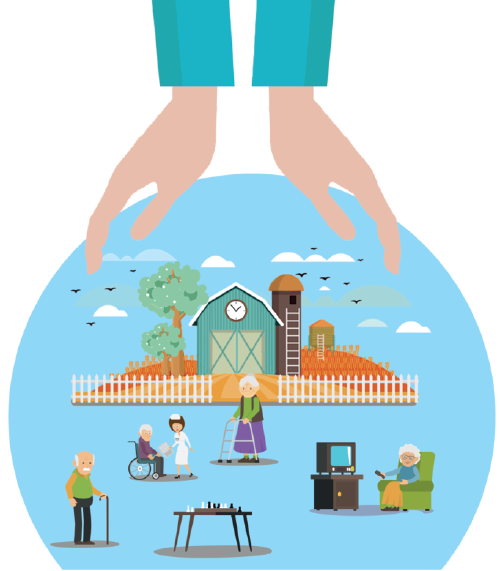作者:彭希哲 发布时间:2020-11-26 来源:复旦发展研究院+收藏本文

作者:彭希哲教授,复旦发展研究院常务副院长。本文发布于China Daily ,2020-11-26.
Elderly people are not burdens on society and deserve greater attention and better services
The novel coronavirus outbreak has affected elderly people the most not only because of their relatively weak immunity but also because the pandemic-induced economic slowdown has had a huge impact on elderly care services.
The elderly have become even more vulnerable because some members of the younger generations are prejudiced against them, which incidentally has a bearing on public policies and services for senior citizens.
Steady and healthy socioeconomic development not only improves people's livelihoods but also ensures they receive better healthcare services. This increases life expectancy, which ironically gives rise to a problem: aging population. According to the United Nations, by the middle of this century, 157 countries and regions will likely be aging societies.
Although China as a whole became an aging society in 2000, the situation varies from region to region. Shanghai, for example, became an aging society way back in 1979, whereas Qinghai province has not yet entered the stage.
China has a huge gray population-about 260 million-which is expected to plateau by 2022 before rising rapidly again thanks to the baby boomers born after 1963. And it is estimated that in the 2023-40 period, China will see a surge in the aging population before it peaks around 2050.
An aging society is defined as one where the population aged 65 or above accounts for 7 percent of the total population, and an aged society is one where the gray population makes up 14 percent of the total. As for a super-aged society, 21 percent of its total population comprises senior citizens. It usually took more than 100 years for Western countries such as France, Sweden and the United Kingdom to make the transition to a super-aged society, whereas countries like Japan, Thailand and China have undergone the demographic change in just 30 years.
While developed countries had 100 years to gradually adapt to the changes brought about by a slowly aging society and adjust their social policies accordingly, China had only 30 years to build its social security system and public healthcare services to cater to the needs of a rapidly aging population.
Considering these facts, rising life expectancy and people's high demand for a healthy life are putting more and more pressure on the pension and social security systems.
Many Chinese families have a1-2-4 structure, in which the family's single child has to take care of both his or her parents and four grandparents. Given this family structure, it is almost impossible to follow the traditional family-based elderly care model across the country. So while rolling out policies that support family-based elderly care, the government should build a system that combines family-and community-based eldercare services, and integrates medical care with eldercare services.
Also, since an aging population will put increasing pressure on the public health system, the authorities should aggressively promote healthy aging, because the pressure on the public health system will be less if elderly people remain healthy for a longer time by maintaining a healthy diet and regularly participating in social and physical activities.
Longer life expectancy also means that people receive a pension over a longer period of time, which puts pressure on the government exchequer, as a worker's income during his or her working years might not be enough to cover his/her pension and other benefits after retirement. Yet the retirement-related policies should be formulated based on China's realities-development level and labor market-and should include revising the labor laws and improving the social security system. It also requires the understanding and support of all citizens.
The UN first defined aging in the 1950s. Thanks to the improvement in people's living conditions and health services, and rising health awareness, a 60-year-old person today is as healthy and capable as a 50-year-old in the past, and 70-year-old are as fit as a 60-year-old in the past. No wonder many health and social science experts suggest that the definition of aging be changed. Some experts say aging should be defined based on how many years a person is expected to live, rather than on the chronological age, which shows how long a person has already lived.
For those who are prejudiced against senior citizens, they tend to believe senior citizens have no economic or social value after retirement. China has a long tradition of respecting the elderly and it is wrong to regard senior citizens as valueless purely from the economic point of view. By raising children and providing them with education and other necessities, senior citizens have already made their contributions to the nation's development. We should therefore create a favorable social and policy environment that benefits senior citizens, and provide lifelong education and training for them to help them keep working and serving society as long as possible.
Japan, for example, believes in a society without retirement, meaning anyone can serve society at any age, which points to a future trend. In fact, retirement is an industrial era socioeconomic arrangement. And even today, in an agricultural society, there was no such thing as retirement.
In this era of information where artificial intelligence and the internet technologies are reshaping the landscape of economic development and labor market, every person, regardless of his/her age, should be able to actively participate in socioeconomic development and equally share the benefits of such development. This is the direction an aging society should take and therefore we should build a society where there is no age-based discrimination.
The author is an executive associate dean at Fudan Development Institute. The author contributed this article to China Watch, a think tank powered by China Daily. The views do not necessarily reflect those of China Daily.
来源丨China Daily
图片丨CUI YUQING